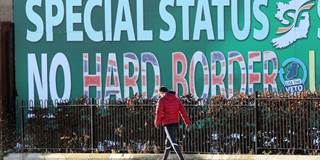Over the last 20 years, the UK and Ireland have reaped the fruits of a mutually respectful and peaceful relationship. But, with Northern Ireland's power-sharing government having broken down, and Brexit raising questions about a potential hard border between the UK and Ireland, the historic Good Friday Agreement may be at risk.
LONDON – Almost exactly 20 years ago, after months of delicate and difficult negotiation, leaders of Northern Ireland’s two main political camps – Catholic nationalists and republicans on one side; Protestant unionists on the other – signed the Good Friday Agreement, ending more than 30 years of violence and bloodshed. Now, that agreement – and the mutually respectful and harmonious relationship that it enabled – is under threat.
The Good Friday Agreement was brokered by the prime ministers of the United Kingdom and the Republic of Ireland – Tony Blair and Bertie Ahern, respectively – with the help of United States Senator George Mitchell. (A great deal of spadework had also been done by Blair’s predecessor, John Major.) It was based on the proposition that, as long as everyone agreed that changes to Northern Ireland’s constitutional status could come only as a result of free democratic choice, people could assert their loyalty to their preferred identity: British, Irish, or even both.
To support peace, the agreement created a power-sharing government in Northern Ireland, with representatives from both sides of the conflict. It also established the Independent Commission on Policing for Northern Ireland, which I chaired, to reform the police service. Our efforts helped to reduce attacks on the police by making them acceptable to all groups, and led to a substantial increase in the recruitment of Catholics, among other things.

LONDON – Almost exactly 20 years ago, after months of delicate and difficult negotiation, leaders of Northern Ireland’s two main political camps – Catholic nationalists and republicans on one side; Protestant unionists on the other – signed the Good Friday Agreement, ending more than 30 years of violence and bloodshed. Now, that agreement – and the mutually respectful and harmonious relationship that it enabled – is under threat.
The Good Friday Agreement was brokered by the prime ministers of the United Kingdom and the Republic of Ireland – Tony Blair and Bertie Ahern, respectively – with the help of United States Senator George Mitchell. (A great deal of spadework had also been done by Blair’s predecessor, John Major.) It was based on the proposition that, as long as everyone agreed that changes to Northern Ireland’s constitutional status could come only as a result of free democratic choice, people could assert their loyalty to their preferred identity: British, Irish, or even both.
To support peace, the agreement created a power-sharing government in Northern Ireland, with representatives from both sides of the conflict. It also established the Independent Commission on Policing for Northern Ireland, which I chaired, to reform the police service. Our efforts helped to reduce attacks on the police by making them acceptable to all groups, and led to a substantial increase in the recruitment of Catholics, among other things.